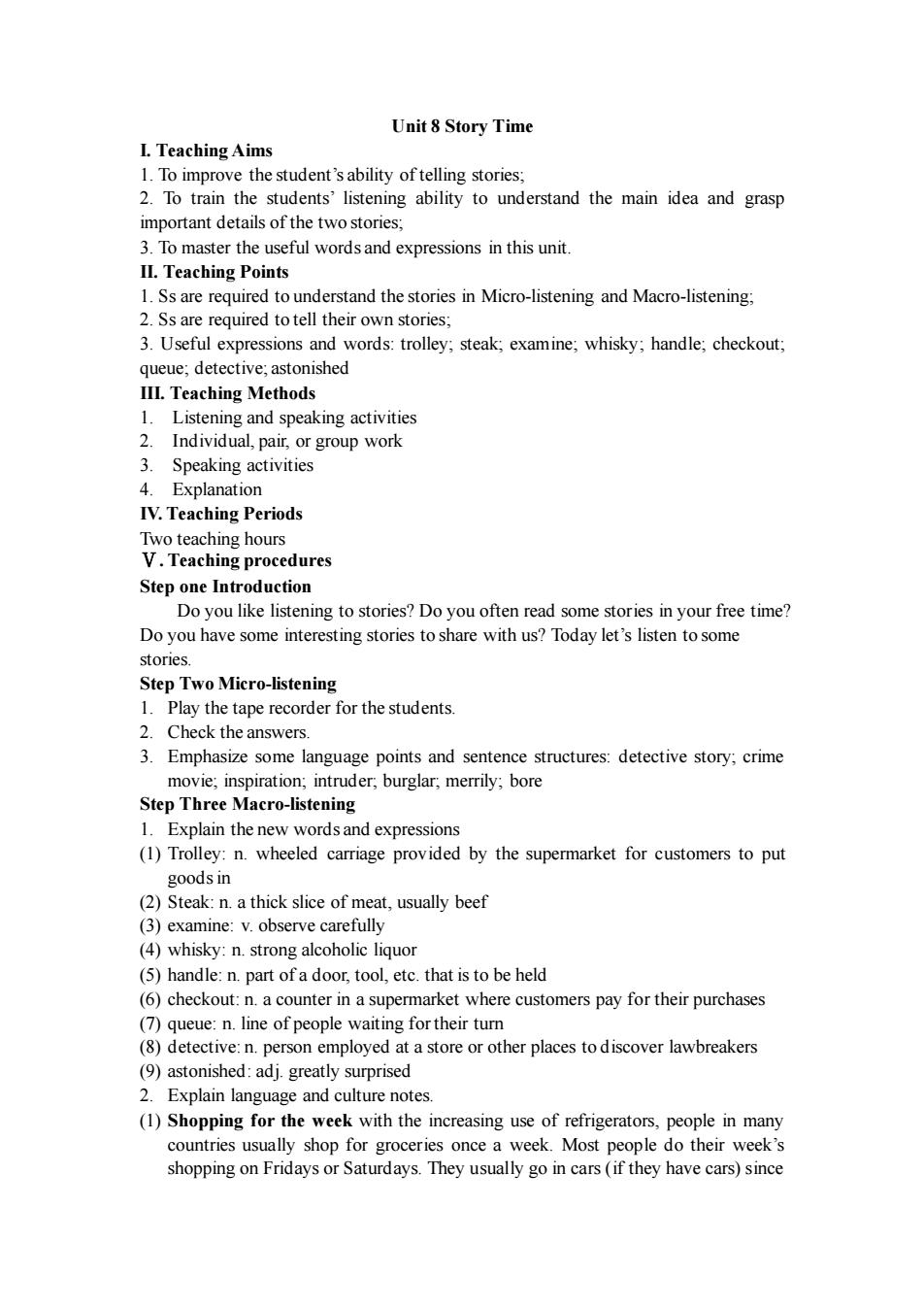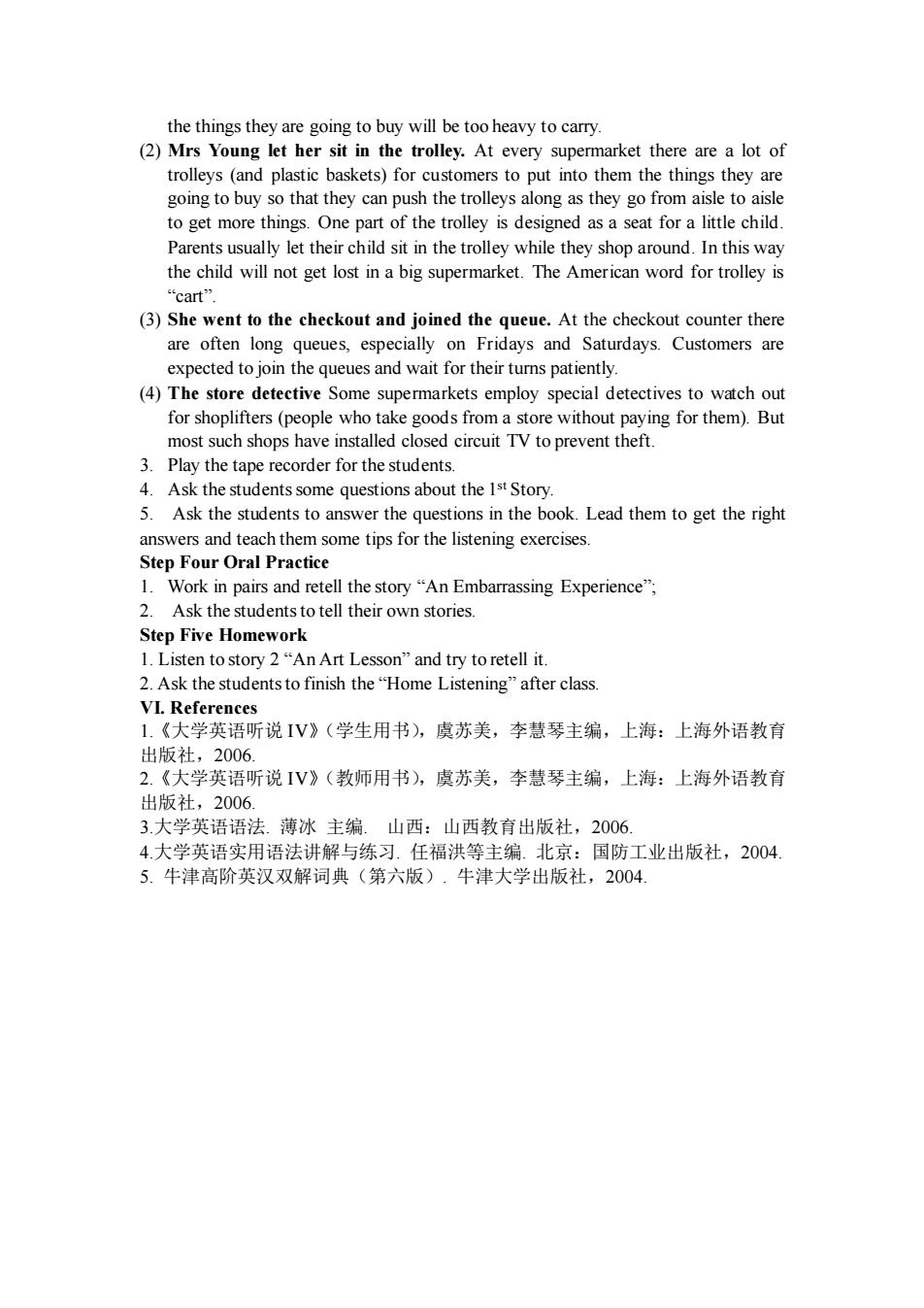
Unit 8 Story Time LTeaching Aims To improve the student'sability of telling stories 2.To train the students'listening ability to understand the main idea and grasp important details of the two stories: 3.To master the useful words and expressions in this unit II.Teaching Points .Ss are required to understand the stories in Micro-listening and Macro-listening. 3.Useful expressions and words:trolley:steak.examine:whisky:handle:checkout; queue;detective;astonished III.Teaching Methods Listen g and speaking activitie Individual,pair,or group work 3 Speaking activities 4 Explanation IV.Teaching Periods ng procedures Step one Introduction Do you like listening to stories?Do you often read some stories in your free time? Do you have some interesting stories to share with us?Today let's listen to some stories. StepTw Mico-e Play the tape recorder for the students 2.Check the answers. 3.Emphasize some language points and sentence structures:detective story;crime movie;inspiration;intruder,burglar;merrily;bore Step Three Macro-listening Explain the new words and expressions (1)Trolley:n.wheeled carriage provided by the supermarket for customers to put goodsin (2)Steak:n.a thick slice of meat,usually beef (3)examine:v.observe carefully (4)whisky:n.strong alcoholic liquor (5)handle:n.part of a door,tool,etc.that is to be held (6)checkout:n.a counter in a supermarket where customers pay for their purchases (7)queue:n.line of people waiting fortheir turn (8)detective:n.person employed at a store or other places todiscover lawbreakers 9。 ished:adj.greatly s Explain language andcu o (1)Shopping for the week with the increasing use of refrigerators,people in many countries usually shop for groceries once a week.Most people do their week's shopping on Fridays or Saturdays.They usually go in cars(if they have cars)since
Unit 8 Story Time I. Teaching Aims 1. To improve the student’s ability of telling stories; 2. To train the students’ listening ability to understand the main idea and grasp important details of the two stories; 3. To master the useful words and expressions in this unit. II. Teaching Points 1. Ss are required to understand the stories in Micro-listening and Macro-listening; 2. Ss are required to tell their own stories; 3. Useful expressions and words: trolley; steak; examine; whisky; handle; checkout; queue; detective; astonished III. Teaching Methods 1. Listening and speaking activities 2. Individual, pair, or group work 3. Speaking activities 4. Explanation IV. Teaching Periods Two teaching hours Ⅴ. Teaching procedures Step one Introduction Do you like listening to stories? Do you often read some stories in your free time? Do you have some interesting stories to share with us? Today let’s listen to some stories. Step Two Micro-listening 1. Play the tape recorder for the students. 2. Check the answers. 3. Emphasize some language points and sentence structures: detective story; crime movie; inspiration; intruder; burglar; merrily; bore Step Three Macro-listening 1. Explain the new words and expressions (1) Trolley: n. wheeled carriage provided by the supermarket for customers to put goods in (2) Steak: n. a thick slice of meat, usually beef (3) examine: v. observe carefully (4) whisky: n. strong alcoholic liquor (5) handle: n. part of a door, tool, etc. that is to be held (6) checkout: n. a counter in a supermarket where customers pay for their purchases (7) queue: n. line of people waiting for their turn (8) detective: n. person employed at a store or other places to discover lawbreakers (9) astonished: adj. greatly surprised 2. Explain language and culture notes. (1) Shopping for the week with the increasing use of refrigerators, people in many countries usually shop for groceries once a week. Most people do their week’s shopping on Fridays or Saturdays. They usually go in cars (if they have cars) since

trolleys (and plastic baskets)for customers to put into them the things they are going to buy so that they can push the trolleys along as they go from aisle to aisle to get more things.One part of the trolley is designed as a seat for a little child. Parents usually let their child sit in the trolley while they shop around.In this way the child will not get lost in a big supermarket.The American word for trolley is (3)She went to the checkout and joined the queue.At the checkout counter there are often long queues,especially on Fridays and Saturdays.Customers are expected to join the queues and wait for their turns patiently. (4)The store detective S permarkets employ special detectives to watch out for shoplifters (people who ake goods from a store without paying for them).But most such shops have installed closed circuit TV to prevent theft. 3.Play the tape recorder for the students. 4.Ask the students some questions about the 1st Story 5.Ask the students to answer the questions in the book.Lead them to get the right answers and tea h them some tips for the listening exercises Step Four Oral Practice Work in pairs and retell the story"An Embarrassing Experience"; 2.Ask the students to tell their own stories. Step Five Homework "and try to retell it VI.References 1.《大学英语听说IV》(学生用书),虞苏美,李慧琴主编,上海:上海外语教育 出版社,2006. 2.《大学英语听说IV》(教师用书),虞苏美,李慧琴主编,上海:上海外语教育 出版,2006 3.大学英语语法.薄冰主编。山西:山西教育出版社,2006 4.大学英语实用语法讲解与练习.任福洪等主编.北京:国防工业出版社,2004. 5.牛津高阶英汉双解词典(第六版).牛津大学出版社,2004
the things they are going to buy will be too heavy to carry. (2) Mrs Young let her sit in the trolley. At every supermarket there are a lot of trolleys (and plastic baskets) for customers to put into them the things they are going to buy so that they can push the trolleys along as they go from aisle to aisle to get more things. One part of the trolley is designed as a seat for a little child. Parents usually let their child sit in the trolley while they shop around. In this way the child will not get lost in a big supermarket. The American word for trolley is “cart”. (3) She went to the checkout and joined the queue. At the checkout counter there are often long queues, especially on Fridays and Saturdays. Customers are expected to join the queues and wait for their turns patiently. (4) The store detective Some supermarkets employ special detectives to watch out for shoplifters (people who take goods from a store without paying for them). But most such shops have installed closed circuit TV to prevent theft. 3. Play the tape recorder for the students. 4. Ask the students some questions about the 1st Story. 5. Ask the students to answer the questions in the book. Lead them to get the right answers and teach them some tips for the listening exercises. Step Four Oral Practice 1. Work in pairs and retell the story “An Embarrassing Experience”; 2. Ask the students to tell their own stories. Step Five Homework 1. Listen to story 2 “An Art Lesson” and try to retell it. 2. Ask the students to finish the “Home Listening” after class. VI. References 1.《大学英语听说 IV》(学生用书),虞苏美,李慧琴主编,上海:上海外语教育 出版社,2006. 2.《大学英语听说 IV》(教师用书),虞苏美,李慧琴主编,上海:上海外语教育 出版社,2006. 3.大学英语语法. 薄冰 主编. 山西:山西教育出版社,2006. 4.大学英语实用语法讲解与练习. 任福洪等主编. 北京:国防工业出版社,2004. 5. 牛津高阶英汉双解词典(第六版). 牛津大学出版社,2004